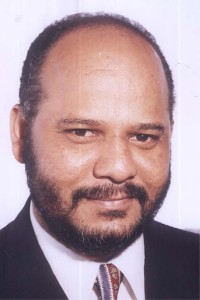Home Affairs Minister, Clement Rohee says he is not ready to speak on the illegal-weapons tracing agreement that the US signed with other regional governments on Tuesday, saying he had “no comment at this time” as to why Guyana was not a signatory.

The Minister said that any pronouncement from him on the issue would come when “I am ready to speak”, and offered no indications as to when a statement would be forthcoming.
Guyana was not among those at the signing ceremony in Barbados because bilateral discussions are still ongoing nearly two years after the initial proposal. Officials involved in the bilateral discussions were unable to complete the process in time to ink the deal which included signatories such as Barbados, St. Kitts and Nevis, St. Lucia, Antigua, St. Vincent and the Grenadines, Dominica and Grenada.
Political and Public Affairs Officer within the local US Embassy, Rolf Olson told Stabroek News that the US proposal was being processed at the bilateral level and not with the region as a collective. He added that Guyana was unable to complete the process in time for the signing.
According to Olson, the US had hoped to sign the agreement with as many regional countries as possible. He noted that that the agreement is an ongoing effort to combat firearm trafficking that grew out of a joint US-Caribbean initiative in 2005 during a summit in Washington. Regional governments that signed onto the US-Caribbean eTrace initiative are expected to benefit from an electronic, paperless system that gauges crime guns seized in their respective countries. The memorandum of understanding which was signed between the US Bureau of Alcohol, Tobacco, Firearms and Explosives (ATF) and ten regional governments provides for the electronic tracing of illicit firearms.
The Barbados Advocate yesterday reported that US Chargé d’Affaires to Barbados and the Eastern Caribbean Dr Brent Hardt, speaking at the signing ceremony on Tuesday, explained that that internet- based eTrace will offer countries a paperless firearm trace system and trace analysis.
Countries are expected to submit, via the Internet, firearms tracing requests in real time and directly to the computer at ATF’s National Tracing Center. The system allows investigators to trace the history of the weapon from the manufacturer, through the dealer to the original purchaser.
Data gained and analyzed from thousands of such traces also provide useful leads in firearms trafficking investigations and eTrace significantly reduces the turnaround time required to process a trace request, and increases the overall number of crime gun traces by providing a user-friendly mechanism for entering trace data.
According to the Barbados Advocate, Hardt also spoke of the expansive reach of the system in the US and the partnerships ATF has forged in countries across the world that are currently using the system. He said too, that Jamaica; The Dominican Republic and The Bahamas became signatories in 2008.
Further, Hardt said that the ATF processed 300,000 crime related requests last year from 58 countries.
Guyana has been plagued by gun crimes in recent years in which many illegal guns have featured.





